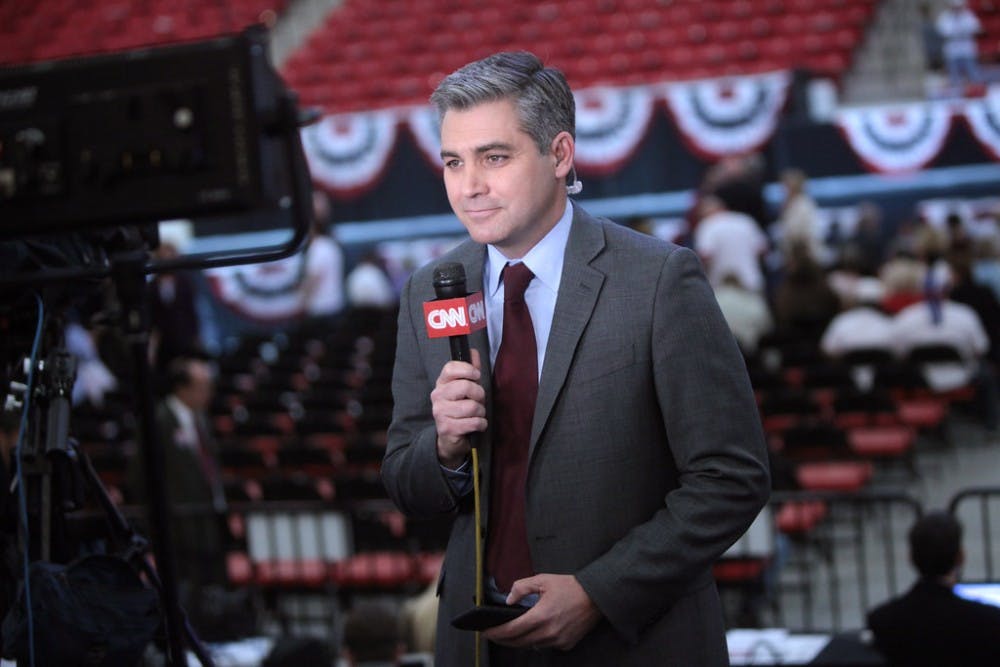On Sept. 23, CNN chief White House correspondent Jim Acosta addressed a packed audience of young and old on campus. In a talk moderated by Julian Zelizer, the Malcolm Stevenson Forbes, Class of 1941 Professor of History and Public Affairs, Acosta discussed the importance of journalism in the modern era and reflected on his experiences reporting on the Trump administration.
Throughout the lecture, Acosta emphasized that the President’s statements have bred violence against journalists. He said he believes that Trump brought the “fake news shtick” to the office, but that since then, the rhetoric has spiraled out of control, and “they don’t know how to reel it back.”
Acosta claimed that since the 2016 election, he has received at least one death threat every week, most notably in a tweet that read “You’re next” and included an image of a decapitated goat. He can now only attend Trump rallies accompanied by bodyguards. He noted that CNN, along with other media outlets that Trump has often singled out for criticism, has received pipe bomb threats, and that a BBC cameraman was attacked at a Trump rally in El Paso last February.
Acosta even expressed serious fear of the nation “getting through” the next election cycle without journalists being physically harmed.
“The moment you have a journalist harmed in this country, or — God forbid — killed, we cease being the United States of America I grew up in,” he said.
Despite the challenges, Acosta’s remarks suggested that he intends to continue his work.
“They can tweet out doctored videos, they can try to attack us, intimidate us, send death threats, and so on,” Acosta said, eliciting the biggest applause of the night. “We are not going to stop doing our job. It’s what people expect of us.”
When asked during the following Q&A whether he has a “call to action” for students like those at the University, Acosta initially struggled to answer, before suggesting, “If you could subscribe to a newspaper, that would be great.” Encouraged by laughter from the crowd, he added, “Set aside a little beer money for that.”

Acosta also warned against believing what he ironically dubbed “real fake news” online. He expects more and more so-called “deep fake” and altered videos to be utilized by campaigns during the upcoming election cycle, such as a recently circulated video in which Nancy Pelosi’s speech was artificially slowed, creating the impression she was intoxicated.
Acosta himself was also targeted by a distorted video, shortly after the White House revoked his press pass in November 2018, sparking a controversy that found even right-wing media outlets siding against the Trump administration. The White House later circulated a doctored video pulled from Alex Jones’ notorious conspiracy website, Infowars, to justify the suspension.
“It was the most Orwellian moment I’ve ever experienced as a journalist,” Acosta said. “A federal judge described the video as of ‘questionable accuracy,’ which is pretty much the closest thing you can get to a sick burn from a federal judge.”
When asked to comment on the way Trump’s Twitter use has changed the media landscape, Acosta gave the president credit.

“He’s zeroed in on this tool in the way that Roosevelt used fireside chats and Kennedy was the TV president,” he noted.
Acosta also responded to a question about the extent to which the media ought to take responsibility for putting Trump in the White House, saying, “I don’t think the press is to blame for Donald Trump being president.”
He called the election an “imperfect storm” and admitted that “we,” in reference to CNN and other major news networks, gave candidate Trump too much airtime and live coverage, a mistake they plan to correct in the future with “more sophisticated coverage” and “fact-checking.”
The lecture took place in McCosh 50 at 4:30 p.m. and was followed by a sale and signing of Acosta’s new book, “The Enemy of the People: A Dangerous Time to Tell the Truth in America.” Acosta’s visit was organized by the Woodrow Wilson School of Public and International Affairs.








